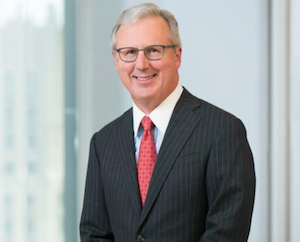Shop talk: Embracing consolidation in oil and gas
TXF spoke with Robin Miles, partner at Bracewell, to outline the impact of depressed oil and gas prices on oil majors and traders. From consolidation to financially over leveraged corporates converting debt to equity with the help of outside investment, the new ebb and flow of the energy market is providing a plethora of opportunities.

 TXF: Although the industry is suffering from depressed oil and gas prices, as with all commodity prices, there is always an ebb and flow. Is this the worst price stagnation that you’ve seen throughout your career?
TXF: Although the industry is suffering from depressed oil and gas prices, as with all commodity prices, there is always an ebb and flow. Is this the worst price stagnation that you’ve seen throughout your career?
Robin Miles (RM): It is probably the worst in terms of the amount of time it is going to last. I’ve been advising on oil and gas deals for 35 years - so I've seen several ups and downs. Off the back of this, we are seeing a lot of mergers coming on in the US right now, where the bigger players are picking up the smaller players because of the stress they're experiencing. There’s more consolidation going on.
We’ve seen this before. But people need to watch the cost and realise that because of weakened demand through the Covid crisis, as well as the shift to renewables, the oil and gas sector is looking to be a different price environment for a longer time.
There are producers in the Middle East and in Russia that can produce at a cheaper cost than we can in the US. So that is going to cause those with weaker balance sheets to consolidate. Some US oil and gas corporates are having to go through bankruptcy, but banks do not want to own them, so they sell them on. That is the main trend I’ve seen.
TXF: Are these corporate mergers a suitable long-term solution to keeping the oil and gas market buoyant?
RM: For offshore production in the US - yes. Many of the smaller independents are fairly financially leveraged and do not have the wherewithal to wait out a longer-term pricing squeeze. So merging with those with better balance sheets allows them to weather the storm for longer, while also reducing costs.
I see it as a healthy development because there’s too many players out here in this depressed price environment.
TXF: What sort of guidance have you given to clients and investors over the last six months?
RM: It has mostly been about coming up with creative ways to refinance or improve our clients’ balance sheets. In the US, this is often done through a bankruptcy process where debt is converted to equity, so there is less debt coming out. That is the main thing we are seeing in the current economic climate.
The other is bringing in outside investment. There are a lot of private equity investments happening in the oil and gas sector, including the midstream sector, just because capital is needed.
We are working on a lot of creative ways to carry out joint ventures and the likes, to bring in outside capital, which is different to debt capital because of the debt markets are fairly closed for oil and gas companies.
The trading companies are still doing fine, although they are having to be very nimble in how they provide hedging arrangements for their customers, because they also face a credit risk and are having to be creative about how to deal with those risks.
TXF: Is the external investment that you are referring to from family offices, alternative trade finance funds or a mixture?
RM: It is a mixture, but mainly the more traditional large private equity funds, and family offices with big check books. It is interesting, you see quite a variety who see opportunity in the distressed markets. They make a decent return and provide equity to continue development and bridge these players to the price environment.
TXF: How severe of an effect is Covid-19 having on your business and what changes have you been seeing in the past six months?
RM: The short-term impact on our business as lawyers has been positive because distress in the oil, gas, and liquids commodities markets creates opportunities for us to guide both investor and operator side clients through this turbulence.
Longer term, however, the pull back in liquids infrastructure development in the US will affect activity for the foreseeable future as investors are likely to pull back from capital investment.
TXF: Which industry players are you seeing start to pull back?
RM: The banks are starting to pull back just because there is a lot of pressure on them with the losses suffered, which creates opportunity for the alternative type of funds to step in. The scaling back of banks creates a vacuum and it must be filled somehow.
In general, commodities corporates prefer to borrow from banks. Until the last year or so, banks were very competitive price wise. But pricing will increase to the point that the alternative funds have more opportunities to come in and meet their investment hurdles, which are which are higher than what the banks typically have.
TXF: Have you already seen, or do you see sustainable deals picking up as a response to the pandemic?
RM: Europe has progressed further ahead of the US on the sustainability front. It is a more central part of the long-term business than over here. But there is starting to be more sustainability chatter in the US especially in offshore wind and battery storage, for example.
A lot of it is tied to the US tax policy that that has been used to subsidize those investments. It is election season now so once we get through that, we will probably have a clearer view on what that might look like in the future.
TXF: In the US, is it not such a common thing to see sustainability-tied debt, where the margin can be decreased slightly if the corporate borrower is able to meet certain sustainability goals?
RM: Not that I have seen much. The government does a similar thing through their tax incentive for equity investment in these projects. But I've not seen it done from the lender's perspective. That’s, again, where Europe is ahead of us.
The European banks are big in the US energy markets and there is pressure from investors and regulators to pay more attention to sustainability. We’re starting to see a focus on it in the US, but it’s not as pervasive as you see in Europe.
TXF: What are your thoughts on oil and gas giants such as Shell and BP committing to heavily investing in renewables? Is this realistic and financially viable?
RM: They have big check books and need to diversify, so I believe they will continue their trend to become bigger players in alternative fuel development and markets.
But it’s going to be harder to make the kind of margins on renewable business than what they make in oil and gas business, although it's very early in the game and that is likely to change. But it will be harder ultimately.
TXF: Do you think commodity trade finance has a long way to go before it is fully digitised?
RM: Well, some areas have become very digitised, such as smaller, bilateral arrangements. But I work more with large commodity trading companies financing their operations with large, syndicated credit facilities. Those financings are more bespoke and not digitized, although the companies themselves have become more digitized, so banks are having to evolve with that.
As banks process so many transactions, anything they can do to squeeze out cost is going to be helpful in protecting them from risk. But right now, we do not always modify our documentation to accommodate digital platforms. It's still very much how we did it 20 years ago.





